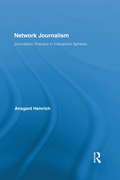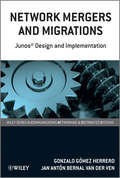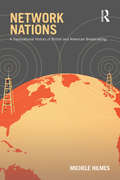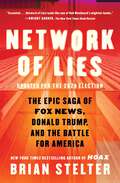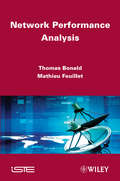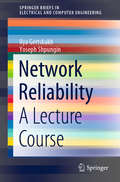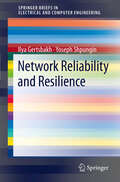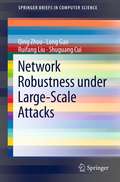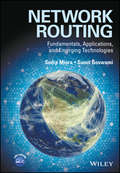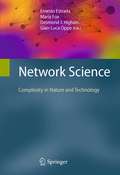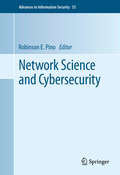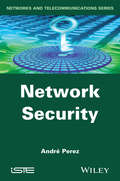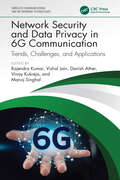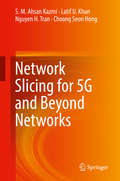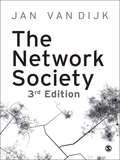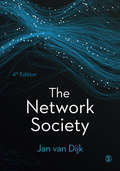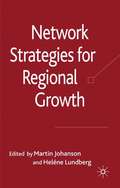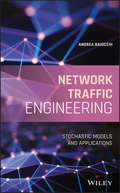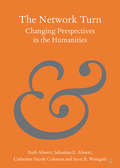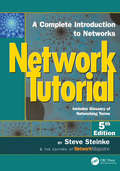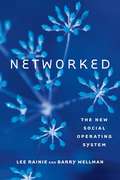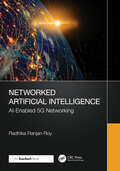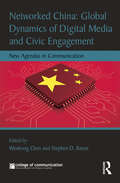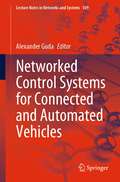- Table View
- List View
Network Journalism: Journalistic Practice in Interactive Spheres (Routledge Research in Journalism)
by Ansgard HeinrichDrawing on current theoretical debates in journalism studies, and grounded in empirical research, Heinrich here analyzes the interplay between journalistic practice and processes of globalization and digitalization. She argues that a new kind of journalism is emerging, characterized by an increasingly global flow of news as well as a growing number of news deliverers. Within this transformed news sphere the roles of journalistic outlets change. They become nodes, arranged in a dense net of information gatherers, producers, and disseminators. The interactive connections among these news providers constitute what Heinrich calls the sphere of "network journalism."
Network Mergers and Migrations
by Jan Ant?n Bernal van der Ven Gonzalo G?mez HerreroThis book provides you with guidelines to plan, design, roll out, and accomplish network migration activities with a variety of internetworking case studies. It considers both enterprise and service provider scenarios based on the expertise from Juniper Networks engineers. From Metro Ethernet migration approaches to comprehensive network protocol consolidation and integration, each case study covers JUNOS resources to ensure successful completion at each migration phase. In addition to an appendix of automation scripts and examples and guidelines for each step, the book also describes the modern challenges that evolve in IT networks.
Network Nations: A Transnational History of British and American Broadcasting
by Michele HilmesIn Network Nations, Michele Hilmes reveals and re-conceptualizes the roots of media globalization through a historical look at the productive transnational cultural relationship between British and American broadcasting. Though frequently painted as opposites--the British public service tradition contrasting with the American commercial system--in fact they represent two sides of the same coin. Neither could have developed without the constant presence of the other, in terms not only of industry and policy but of aesthetics, culture, and creativity, despite a long history of oppositional rhetoric. Based on primary research in British and American archives, Network Nations argues for a new transnational approach to media history, looking across the traditional national boundaries within which media is studied to encourage an awareness that media globalization has a long and fruitful history. Placing media history in the framework of theories of nationalism and national identity, Hilmes examines critical episodes of transnational interaction between the US and Britain, from radio’s amateurs to the relationship between early network heads; from the development of radio features and drama to television spy shows and miniseries; as each other’s largest suppliers of programming and as competitors on the world stage; and as a network of creative, business, and personal relationships that has rarely been examined, but that shapes television around the world. As the global circuits of television grow and as global regions, particularly Europe, attempt to define a common culture, the historical role played by the British/US media dialogue takes on new significance.
Network of Lies: The Epic Saga of Fox News, Donald Trump, and the Battle for American Democracy
by Brian StelterFox News paid almost a billion dollars in legal settlements to bury the contents of this &“essential…grinding, momentum-building&” (The New York Times) account of the network&’s blatant attempts to manipulate the truth, mislead the public, and influence our elections—from the New York Times bestselling author of Hoax.The ongoing criminal trials of Donald Trump are also a trial for the nation he once led. We are undergoing a stress test of American democracy, the rule of law, and the very notion of a shared political reality. Can we achieve accountability for premeditated assaults on democracy and what forms should accountability take? In Network of Lies, New York Times bestselling author Brian Stelter answers these questions by weaving together private texts, unpublished emails, depositions, and other primary sources to tell the chilling story of Trump&’s alleged conspiracy to steal the 2020 election, and the right-wing media&’s mission to put him back in office in 2024. Trump couldn&’t have convinced millions of Americans of the Big Lie without Fox News. From the moment Joe Biden became president-elect in 2020, Fox hosts fueled a fire of misinformation and violence by spreading Trump&’s tales of election fraud and suppressing the truth. Come January, Sean Hannity insisted Trump needed to stop listening to &“crazy people&” who swore he could stay in power, but it was too late—thousands of Trump&’s deluded followers had stormed the Capitol and Trump operatives had breached Dominion Voting Systems&’ voting machines in Georgia. Now, the 2020 lies are at the center of numerous indictments and his reelection campaign, but Trump is not the only one under fire. The once-untouchable Rupert Murdoch has been held accountable. Dominion&’s legal war, chronicled in-depth for the first time here, revealed that the ninety-two-year-old Fox chairman knew Trump&’s lies were dangerous but he allowed the lies to fill Fox&’s airwaves because, as his &“pain sponge&” Suzanne Scott admitted, telling the truth was &“bad for business.&” Network of Lies goes inside the chat rooms, board rooms, and court rooms where the pro-Trump media&’s greed and selfishness were exposed. Featuring Stelter&’s &“thorough and damning&” (The New York Times) investigative prowess and direct quotations so shocking they read like fiction, Network of Lies is the definitive origin story of Trump&’s attempt to tear down the guardrails of American democracy, and an urgent plea to learn from past mistakes as we head into 2024&’s pivotal presidential election.
Network Performance Analysis (Wiley-iste Ser.)
by Thomas Bonald Mathieu FeuilletThe book presents some key mathematical tools for the performance analysis of communication networks and computer systems. Communication networks and computer systems have become extremely complex. The statistical resource sharing induced by the random behavior of users and the underlying protocols and algorithms may affect Quality of Service. This book introduces the main results of queuing theory that are useful for analyzing the performance of these systems. These mathematical tools are key to the development of robust dimensioning rules and engineering methods. A number of examples illustrate their practical interest.
Network Reliability: A Lecture Course (SpringerBriefs in Electrical and Computer Engineering)
by Ilya Gertsbakh Yoseph ShpunginThis introductory book equips the reader to apply the core concepts and methods of network reliability analysis to real-life problems. It explains the modeling and critical analysis of systems and probabilistic networks, and requires only a minimal background in probability theory and computer programming. Based on the lecture notes of eight courses taught by the authors, the book is also self-contained, with no theory needed beyond the lectures. The primary focus is on essential “modus operandi,” which are illustrated in numerous examples and presented separately from the more difficult theoretical material.
Network Reliability and Resilience
by Ilya Gertsbakh Yoseph ShpunginThis book is devoted to the probabilistic description of the behavior of a network in the process of random removal of its components (links, nodes) appearing as a result of technical failures, natural disasters or intentional attacks. It is focused on a practical approach to network reliability and resilience evaluation, based on applications of Monte Carlo methodology to numerical approximation of network combinatorial invariants, including so-called multidimensional destruction spectra. This allows to develop a probabilistic follow-up analysis of the network in the process of its gradual destruction, to identify most important network components and to develop efficient heuristic algorithms for network optimal design. Our methodology works with satisfactory accuracy and efficiency for most applications of reliability theory to real -life problems in networks.
Network Robustness under Large-Scale Attacks
by Ruifang Liu Shuguang Cui Qing Zhou Long GaoNetwork Robustness under Large-Scale Attacks provides the analysis of network robustness under attacks, with a focus on large-scale correlated physical attacks. The book begins with a thorough overview of the latest research and techniques to analyze the network responses to different types of attacks over various network topologies and connection models. It then introduces a new large-scale physical attack model coined as area attack, under which a new network robustness measure is introduced and applied to study the network responses. With this book, readers will learn the necessary tools to evaluate how a complex network responds to random and possibly correlated attacks.
Network Routing: Fundamentals, Applications, and Emerging Technologies
by Sudip Misra Sumit GoswamiNetwork Routing: Fundamentals, Applications and Emerging Technologies serves as single point of reference for both advanced undergraduate and graduate students studying network routing, covering both the fundamental and more moderately advanced concepts of routing in traditional data networks such as the Internet, and emerging routing concepts currently being researched and developed, such as cellular networks, wireless ad hoc networks, sensor networks, and low power networks.
Network Science
by Desmond J. Higham Gian-Luca Oppo Ernesto Estrada Maria FoxNetwork Science is the emerging field concerned with the study of large, realistic networks. This interdisciplinary endeavor, focusing on the patterns of interactions that arise between individual components of natural and engineered systems, has been applied to data sets from activities as diverse as high-throughput biological experiments, online trading information, smart-meter utility supplies, and pervasive telecommunications and surveillance technologies. This unique text/reference provides a fascinating insight into the state of the art in network science, highlighting the commonality across very different areas of application and the ways in which each area can be advanced by injecting ideas and techniques from another. The book includes contributions from an international selection of experts, providing viewpoints from a broad range of disciplines. It emphasizes networks that arise in nature--such as food webs, protein interactions, gene expression, and neural connections--and in technology--such as finance, airline transport, urban development and global trade. Topics and Features: begins with a clear overview chapter to introduce this interdisciplinary field; discusses the classic network science of fixed connectivity structures, including empirical studies, mathematical models and computational algorithms; examines time-dependent processes that take place over networks, covering topics such as synchronisation, and message passing algorithms; investigates time-evolving networks, such as the World Wide Web and shifts in topological properties (connectivity, spectrum, percolation); explores applications of complex networks in the physical and engineering sciences, looking ahead to new developments in the field. Researchers and professionals from disciplines as varied as computer science, mathematics, engineering, physics, chemistry, biology, ecology, neuroscience, epidemiology, and the social sciences will all benefit from this topical and broad overview of current activities and grand challenges in the unfolding field of network science.
Network Science and Cybersecurity
by Robinson E. PinoNetwork Science and Cybersecurity introduces new research and development efforts for cybersecurity solutions and applications taking place within various U.S. Government Departments of Defense, industry and academic laboratories. This book examines new algorithms and tools, technology platforms and reconfigurable technologies for cybersecurity systems. Anomaly-based intrusion detection systems (IDS) are explored as a key component of any general network intrusion detection service, complementing signature-based IDS components by attempting to identify novel attacks. These attacks may not yet be known or have well-developed signatures. Methods are also suggested to simplify the construction of metrics in such a manner that they retain their ability to effectively cluster data, while simultaneously easing human interpretation of outliers. This is a professional book for practitioners or government employees working in cybersecurity, and can also be used as a reference. Advanced-level students in computer science or electrical engineering studying security will also find this book useful .
Network Security
by André PerezThis book introduces the security mechanisms deployed in Ethernet, Wireless-Fidelity (Wi-Fi), Internet Protocol (IP) and MultiProtocol Label Switching (MPLS) networks. These mechanisms are grouped throughout the book according to the following four functions: data protection, access control, network isolation, and data monitoring.Data protection is supplied by data confidentiality and integrity control services. Access control is provided by a third-party authentication service. Network isolation is supplied by the Virtual Private Network (VPN) service. Data monitoring consists of applying rules to data in order to authorize its transfer or detect attacks.The chapters of the book cover cryptography, 802.1x mechanism, WPA mechanisms, IPSec mechanism, SSL/TLS/DTLS protocols, network management, MPLS technology, Ethernet VPN, firewalls and intrusion detection.
Network Security and Data Privacy in 6G Communication: Trends, Challenges, and Applications (Wireless Communications and Networking Technologies)
by Rajendra Kumar Vishal Jain Danish Ather Vinay KukrejaThis book proposes robust solutions for securing a network against intrusions for data privacy and safety. It includes theoretical models, commercialization of validated models, and case studies. Explains the integration of technologies such as artificial intelligence, the Internet of Things, and blockchain for network security in a 6G communication system. Highlights the challenges such as spectrum allocation and management, network architecture and heterogeneity, energy efficiency and sustainability, antenna, and radio frequency. Discuss theories like quantum-safe cryptography, zero-trust networking, and blockchain-based trust management. Covers emerging technologies including homomorphic encryption, secure multi-party computation, post-quantum cryptography, and distributed ledger technology for security and privacy in 6G communication systems. Presents light and deep secure algorithms to detect fake incidents in wireless communication. The text is primarily written for senior undergraduates, graduate students, and academic researchers in fields including electrical engineering, electronics and communications engineering, and computer science.
Network Slicing for 5G and Beyond Networks
by S. M. Kazmi Latif U. Khan Nguyen H. Tran Choong Seon HongThis book provides a comprehensive guide to the emerging field of network slicing and its importance to bringing novel 5G applications into fruition. The authors discuss the current trends, novel enabling technologies, and current challenges imposed on the cellular networks. Resource management aspects of network slicing are also discussed by summarizing and comparing traditional game theoretic and optimization based solutions. Finally, the book presents some use cases of network slicing and applications for vertical industries. Topics include 5G deliverables, Radio Access Network (RAN) resources, and Core Network (CN) resources. Discusses the 5G network requirements and the challenges therein and how network slicing offers a solutionFeatures the enabling technologies of future networks and how network slicing will play a rolePresents the role of machine learning and data analytics for future cellular networks along with summarizing the machine learning approaches for 5G and beyond networks
The Network Society: Social Aspects Of New Media (Ebook Ser.)
by Jan A. van DijkThe Network Society is now more than ever the essential guide to the past, consequences and future of digital communication. Fully revised, this Third Edition covers crucial new issues and updates, including: * the long history of social media and Web 2.0: why it's not as new as we think * digital youth culture as a foreshadow of future new media use * the struggle for control of the internet among Microsoft, Google, Apple and Facebook * the contribution of media networks to the current financial crisis * complete update of the literature on the facts, theories, trends and technologies of the internet * new features for students with boxes of chapter questions, conclusions and boxed explanations of key concepts This book remains an accessible, comprehensive, must-read introduction to how new media function in contemporary society.
The Network Society
by Jan A van DijkThe Network Society is a clear, engaging guide to the past, consequences and future of digital communication, and forms a comprehensive introduction to how new media functions in contemporary society. Integrating both face-to-face and online communication, the fourth edition explores crucial new issues and challenges in today’s digital media ecology, in doing so exploring the centrality of power to understanding life in the network society. Featuring: The rise of the ‘data economy’ The increasing importance of artificial intelligence. big data and robotics The growth of Internet platforms and how to regulate big tech. New coverage of disinformation and fake news, including deep fake videos Updates to the story of digital youth culture, as a foreshadow of future new media use With examples, cases and real-world applications, this is the essential guide for digital and new media students seeking to understand a diverse, fast-moving field.
The Network Society
by Jan A van DijkThe Network Society is a clear, engaging guide to the past, consequences and future of digital communication, and forms a comprehensive introduction to how new media functions in contemporary society. Integrating both face-to-face and online communication, the fourth edition explores crucial new issues and challenges in today’s digital media ecology, in doing so exploring the centrality of power to understanding life in the network society. Featuring: The rise of the ‘data economy’ The increasing importance of artificial intelligence. big data and robotics The growth of Internet platforms and how to regulate big tech. New coverage of disinformation and fake news, including deep fake videos Updates to the story of digital youth culture, as a foreshadow of future new media use With examples, cases and real-world applications, this is the essential guide for digital and new media students seeking to understand a diverse, fast-moving field.
Network Strategies for Regional Growth
by Martin Johanson Heléne LundbergIn many regions the current focus of the state is to initiate and stimulate the emergence of inter-firm networks in order to produce growth. This book takes a management perspective on the operations and processes in these networks and describes and analyzes how and why geographical proximity influences inter-firm networks.
Network Traffic Engineering: Stochastic Models and Applications
by Andrea BaiocchiA comprehensive guide to the concepts and applications of queuing theory and traffic theory Network Traffic Engineering: Models and Applications provides an advanced level queuing theory guide for students with a strong mathematical background who are interested in analytic modeling and performance assessment of communication networks. The text begins with the basics of queueing theory before moving on to more advanced levels. The topics covered in the book are derived from the most cutting-edge research, project development, teaching activity, and discussions on the subject. They include applications of queuing and traffic theory in: LTE networks Wi-Fi networks Ad-hoc networks Automated vehicles Congestion control on the Internet The distinguished author seeks to show how insight into practical and real-world problems can be gained by means of quantitative modeling. Perfect for graduate students of computer engineering, computer science, telecommunication engineering, and electrical engineering, Network Traffic Engineering offers a supremely practical approach to a rapidly developing field of study and industry.
The Network Turn: Changing Perspectives in the Humanities (Elements in Publishing and Book Culture)
by Ruth Ahnert Sebastian E. Ahnert Catherine Nicole Coleman Scott B. WeingartWe live in a networked world. Online social networking platforms and the World Wide Web have changed how society thinks about connectivity. Because of the technological nature of such networks, their study has predominantly taken place within the domains of computer science and related scientific fields. But arts and humanities scholars are increasingly using the same kinds of visual and quantitative analysis to shed light on aspects of culture and society hitherto concealed. This Element contends that networks are a category of study that cuts across traditional academic barriers, uniting diverse disciplines through a shared understanding of complexity in our world. Moreover, we are at a moment in time when it is crucial that arts and humanities scholars join the critique of how large-scale network data and advanced network analysis are being harnessed for the purposes of power, surveillance, and commercial gain. This title is also available as Open Access on Cambridge Core.
Network Tutorial: A Complete Introduction to Networks Includes Glossary of Networking Terms
by Steve SteinkeNetwork Tutorial delivers insight and understanding about network technology to managers and executives trying to get up to speed or stay current with the complex challenges of designing, constructing, maintaining, upgrading, and managing the netwo
Networked
by Lee Rainie Barry WellmanDaily life is connected life, its rhythms driven by endless email pings and responses, the chimes and beeps of continually arriving text messages, tweets and retweets, Facebook updates, pictures and videos to post and discuss. Our perpetual connectedness gives us endless opportunities to be part of the give-and-take of networking. Some worry that this new environment makes us isolated and lonely. But in Networked, Lee Rainie and Barry Wellman show how the large, loosely knit social circles of networked individuals expand opportunities for learning, problem solving, decision making, and personal interaction. The new social operating system of "networked individualism" liberates us from the restrictions of tightly knit groups; it also requires us to develop networking skills and strategies, work on maintaining ties, and balance multiple overlapping networks. Rainie and Wellman outline the "triple revolution" that has brought on this transformation: the rise of social networking, the capacity of the Internet to empower individuals, and the always-on connectivity of mobile devices. Drawing on extensive evidence, they examine how the move to networked individualism has expanded personal relationships beyond households and neighborhoods; transformed work into less hierarchical, more team-driven enterprises; encouraged individuals to create and share content; and changed the way people obtain information. Rainie and Wellman guide us through the challenges and opportunities of living in the evolving world of networked individuals.
Networked Artificial Intelligence: AI-Enabled 5G Networking
by Radhika Ranjan RoyThe integration of fifth generation (5G) wireless technologies with distributed artificial intelligence (AI) is transforming network operations. AI is increasingly embedded in all network elements, from cloud and edge to terminal devices, enabling AI to function as a networking system. This convergence facilitates AI-based applications across the global network, with notable successes in various domains such as computer vision, natural language processing, and healthcare. Networked Artificial Intelligence: AI-Enabled 5G Networking a comprehensive framework for the deep integration of computing and communications, optimizing networks and applications as a unified system using AI.The book covers topics ranging from networked AI fundamentals to AI-enabled 5G networks, including agent modeling, machine learning (ML) algorithms, and network protocol architectures. It discusses how network service providers can leverage AI and ML techniques to customize network baselines, reduce noise, and accurately identify issues. It also looks at AI-driven networks that enable self-correction for maximum uptime and prescriptive actions for issue resolution, as well as troubleshooting by capturing and storing data before network events.The book presents a comprehensive approach to AI-enabled networking that offers unprecedented opportunities for efficiency, reliability, and innovation in telecommunications. It works through the approach’s five steps of connection, communication, collaboration, curation, and community. These steps enhance network effects, empowering operators with insights for trusted automation, cost reduction, and optimal user experiences. The book also discusses AI and ML capabilities that enable networks to continuously learn, self-optimize, and predict and rectify service degradations proactively, even with full automation.
Networked China: New Agendas in Communication (New Agendas in Communication Series)
by Stephen D. Reese Wenhong ChenThe Internet and digital media have become conduits and locales where millions of Chinese share information and engage in creative expression and social participation. This book takes a cutting-edge look at the impacts and implications of an increasingly networked China. Eleven chapters cover the terrain of a complex social and political environment, revealing how modern China deals with digital media and issues of censorship, online activism, civic life, and global networks. The authors in this collection come from diverse geographical backgrounds and employ methods including ethnography, interview, survey, and digital trace data to reveal the networks that provide the critical components for civic engagement in Chinese society. The Chinese state is a changing, multi-faceted entity, as is the Chinese public that interacts with the new landscape of digital media in adaptive and novel ways. Networked China: Global Dynamics of Digital Media and Civic Engagement situates Chinese internet in its complex, generational context to provide a full and dynamic understanding of contemporary digital media use in China. This volume gives readers new agendas for this study and creates vital new signposts on the way for future research. .
Networked Control Systems for Connected and Automated Vehicles: Volume 1 (Lecture Notes in Networks and Systems #509)
by Alexander GudaThis book is a collection of the latest research findings in such areas as networked multi-agent systems, co-design of communication and control, distributed control strategies that can cope with asynchrony between local loops, event-triggered control, modelling of network infrastructure, novel concepts of distributed control for networked and cyber-physical systems. The book contains the result of the latest research in the field of communication and control system design to support networked control systems with stringent real-time requirements. It introduces readers to research in the field of joint design of the control and communication protocol and presents the latest developments in the area of novel optimal control and scheduling designs under resource constraints.The book also covers the issues of creating emerging information and communication technologies for traffic estimation and control, connected and autonomous technology applications and modelling for commercial and shared vehicle operations. The reader will find information on emerging cyber-physical systems, networked multi-agent systems, large-scale distributed energy systems, as well as on real-time systems, safety and security systems.A significant block of studies is devoted to the topic of transitions towards electrification and automation of vehicles. Modern concepts of road infrastructure construction are described in detail in the presented research papers.Automotive industry professionals will be particularly interested in the sections on the novel mechanisms for medium access in multi-hop wireless networks with real-time requirements, optimal layering architecture and co-design for wireless communication. The book will be incredibly interesting for researchers interested in human–digital interfaces, industrial Internet of Things, artificial intelligence and machine learning.
